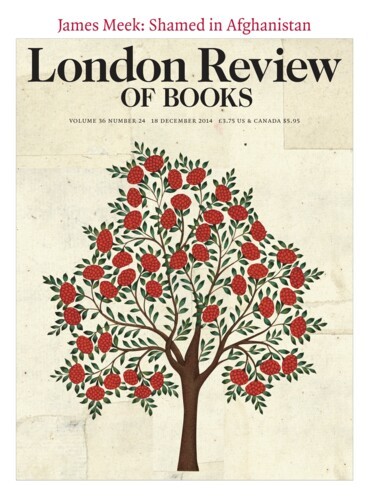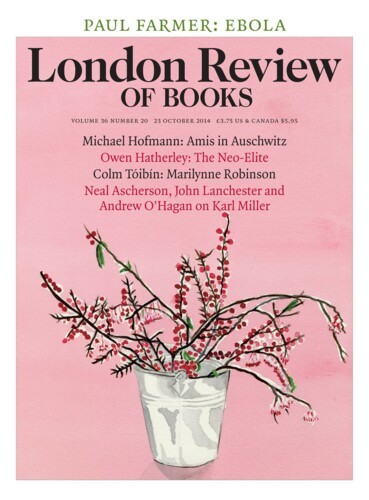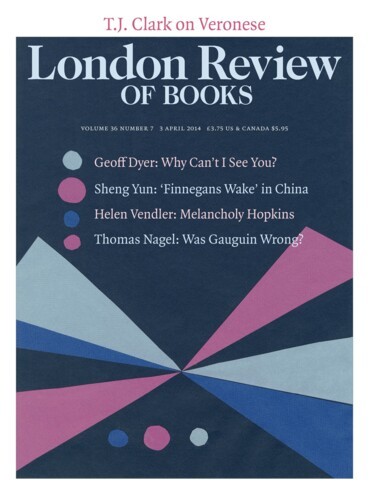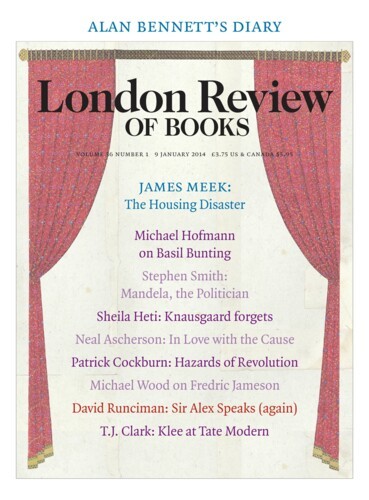Michael Hofmann
Michael Hofmann is a poet and translator from German of books by Thomas Bernhard, Jenny Erpenbeck, Günter Grass, Franz Kafka, Joseph Roth and Patrick Süskind, among many others. He teaches at the University of Florida. He has contributed dozens of poems to the LRB since 1980 and more than sixty pieces, on subjects including Stefan Zweig, Bohumil Hrabal, Halldór Laxness, Caspar David Friedrich and boarding schools.
Is his name Alwyn? Richard Flanagan’s Sticky Collage
Michael Hofmann, 18 December 2014
It’s May or June, the Cam is stuffed with expensive punts, which in turn are stuffed with moneyed tourists. A bunch of under-employed post-examinal students are dementedly heaving and levering away at one of the massive ornamental granite balls crowning the parapet of one of the college bridges. They’ve prised it loose, the entire river – the strollers and dawdlers and smoochers along the Backs, the rest of the shipping – seems to be watching in horror as it’s directly threatening a punt-load of Japanese tourists.
Splashing through the Puddles: Amis in Auschwitz
Michael Hofmann, 23 October 2014
I read The Zone of Interest straight through twice from beginning to end and it feels like I’ve read nothing at all. I could read it again, if I thought it would make any difference. Perhaps in some strange way it’s a compliment to the book – this love story set among Germans in Auschwitz: good idea? waiting world? story whose time has come? yes? – or to its calculation, its finely calibrated scales, that what survives of it is (pace Larkin) nothing. That nothing finally preponderates, no sensation remains, no vision, no synthesis, no understanding.
All Fresh Today: Karen Solie
Michael Hofmann, 3 April 2014
Introducing Karen Solie, I would adapt what Joseph Brodsky said some thirty years ago of the great Les Murray: ‘It would be as myopic to regard Mr Murray as an Australian poet as to call Yeats an Irishman. He is, quite simply, the one by whom the language lives.’ Solie is Canadian (born in 1966, in Moose Jaw, Saskatchewan, of Norwegian immigrant stock), the author of three...
Imagine Tintin: Basil Bunting
Michael Hofmann, 9 January 2014
Just as some faces are a gift to the photographer (Artaud, Patti Smith), so certain lives are a gift to the biographer. These are, broadly, of two types: the hard and gemlike, abbreviated, compressed, intense; and the lengthy, implausible, exfoliated, whiskery, picaresque. Vehement or even violent emotion is good, overt drama, prominent contacts or associations, sudden changes of...
Podcasts & Videos
Michael Hofmann and Declan Ryan: One Lark, One Horse
Michael Hofmann
Michael Hofmann talks to Declan Ryan about his first new collection in almost two decades, One Lark, One Horse.
Pieces about Michael Hofmann in the LRB
Go for it, losers: Werner Herzog’s Visions
David Trotter, 30 November 2023
Documentary has customarily been regarded as a genre duty-bound to deal in facts. But the only duty Herzog has ever felt as a filmmaker is, as he puts it, to ‘follow a grand vision’.
Hurt in the Guts: A Masterpiece and a Disaster
Joe Dunthorne, 1 April 2021
Kafka wrote that, were it not for the final act, Michael Kohlhaas would be ‘a thing of perfection’, which is a diplomatic way of saying that Kleist absolutely butchers it. In fact, one of the many...
What a carry-on: W.S. Graham
Seamus Perry, 18 July 2019
Many poets end up having a hard life but W.S. Graham went out of his way to have one. His dedication to poetry, about which he seems never to have had a second thought, was remorseless, and his instinct,...
On the Via Dolorosa: Remarque’s Fiction
Neal Ascherson, 7 May 2015
Remarque apparently knew that The Promised Land would be his last novel, and meant it to be one of his finest, perhaps his masterwork.
The Man Who Wrote Too Much: Jakob Wassermann
Nick Richardson, 7 March 2013
Jakob Wassermann, who published nearly a book a year for the last thirty years of his life but died broke and exhausted, soon to be forgotten, on 1 January 1934 at the age of sixty, was well...
Opposite: Peter Stamm
Benjamin Lytal, 30 August 2012
‘Literature should be naked,’ Peter Stamm writes. Words should never obscure the story, ‘its warmth, its form, its vitality’. It’s form that critics in Germany and...
The cow, the shoe, then you: Hans Fallada
Philip Oltermann, 8 March 2012
On Tuesday, 17 October 1911, 18-year-old Rudolf Ditzen, the future Hans Fallada, got up before dawn to meet his schoolfriend Hanns Dietrich von Necker at a tourist spot outside Rudolstadt in...
Extreme Understanding: Irmgard Keun
Jenny Diski, 10 April 2008
As any adult can tell you – or any adult not given over entirely to mawkish and convenient notions of innocence – children are born spies. Every parent (previously an independent...
Tooloose-Lowrytrek: Malcolm Lowry
Elizabeth Lowry, 1 November 2007
The two central facts about Malcolm Lowry are that he wrote and that he drank. He drank while writing – or possibly he wrote while drinking. When he died in June 1957 after downing a lethal...
A Leap from the Bridge: Wolfgang Koeppen
Alexander Scrimgeour, 12 December 2002
Between 1951 and 1954, Wolfgang Koeppen published three scathing, disillusioned novels ridiculing the notion of a new start and a clean slate for West Germany. At the time, perhaps as many as 80...
To Live like a Bird
Mark Rudman, 1 June 2000
Michael Hofmann’s poetry is a lament for a lost world. Some years ago, in an article on Frank O’Hara, he talked about New York no longer being the thrilling place it had been in the...
Empire of Signs: Joseph Roth
James Wood, 4 March 1999
With Joseph Roth, you begin – and end – with the prose. The great delight of this Austrian novelist, who wrote in the Twenties and Thirties, lies in his strange, nimble, curling...
Chilly
Penelope Fitzgerald, 9 February 1995
At the age of 48, after thirty years of lecturing on German literature and writing radio plays, Gert Hofmann began to produce disconcerting novels. Michael Hofmann, his son, the poet, confronted...
Never for me
Michael Wood, 2 December 1993
‘I was not myself. I was just anyone.’ The person who says ‘I’ in Michael Hofmann’s earlier poems is uncertain, diffident, angry; he seems both gnarled and youthful,...
Self-Hatred
Gabriele Annan, 5 November 1992
This German novel has waited nearly forty years for its English translator. Michael Hofmann fell in love the moment the Good Fairy told him about it, and set out to liberate it from the thorn...
No more pretty face
Philip Horne, 8 March 1990
Wim Wender’s very pleasurable Paris, Texas (1984) is both an American movie and a European film. Its creative pedigree is mixed – all through the credits: the German Wenders as...
Foreigners
John Lanchester, 5 January 1989
Attentive readers of the Guardian’s news pages will already know about Arabesques. A 1986 report from Jerusalem told readers of a first novel by a 36-year-old writer which was making a big...
French Air
John Sutherland, 12 November 1987
In his autobiographical papers, Surely you’re joking, Mr Feynman?, the Nobel Prize-winning physicist, Richard Feynman, describes being piqued by an article in Science about how well...
Tales of Hofmann
Blake Morrison, 20 November 1986
The acrimony in Michael Hofmann’s book is that of a son towards his father. Like a family photograph album, the sequence ‘My Father’s House’ records the son’s growth...
We shall not be moved
John Bayley, 2 February 1984
There remains a most decided difference – indeed it grows wider every year – between what Philip Larkin calls ‘being a writer’, or ‘being a poet’, and managing...
Read anywhere with the London Review of Books app, available now from the App Store for Apple devices, Google Play for Android devices and Amazon for your Kindle Fire.
Sign up to our newsletter
For highlights from the latest issue, our archive and the blog, as well as news, events and exclusive promotions.




